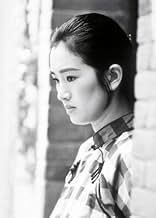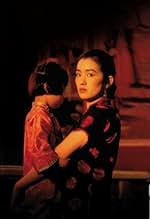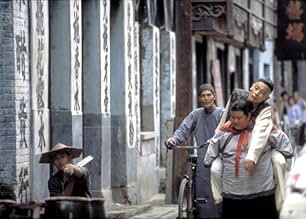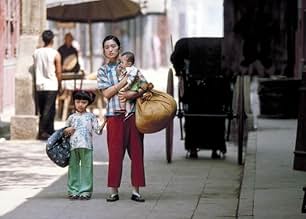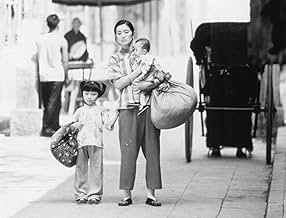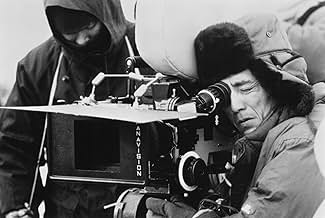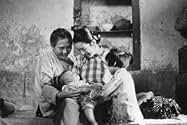Depois que Fugui e Jiazhen perdem suas fortunas pessoais, eles formam uma família e sobreviveram às difíceis mudanças culturais entre as décadas de 1940 a 1970, na China.Depois que Fugui e Jiazhen perdem suas fortunas pessoais, eles formam uma família e sobreviveram às difíceis mudanças culturais entre as décadas de 1940 a 1970, na China.Depois que Fugui e Jiazhen perdem suas fortunas pessoais, eles formam uma família e sobreviveram às difíceis mudanças culturais entre as décadas de 1940 a 1970, na China.
- Ganhou 1 prêmio BAFTA
- 5 vitórias e 6 indicações no total
Avaliações em destaque
Both leading actors nicely portray the way their characters change over the years. At first, Fugui is the stereotypical "callow young man" and Jiazhen the even more stereotypical "long- suffering wife," but the screenplay and actors eventually deepen the characterizations.
The best sequence of the film covers the Chinese Civil War. Wisely, Yimou Zhang resists the temptation to make the movie too epic, and instead focuses on Fugui's personal experiences. The result is a very moving depiction of the human cost of war. In another striking touch, Fugui's hobby is singing with a shadow-puppet troupe. The puppets not only provide an interesting glimpse into traditional Chinese culture, they also take on a symbolic meaning.
After watching "To Live," it's easy to see why the Chinese authorities banned it: there's a lot of tragedy in the film, and in most cases, Communism is to blame. Remarkably, though, Zhang also makes many of the Communist characters sympathetic. For instance, Fugui and Jiazhen's daughter marries an officer in the Red Guards, who is a little ridiculous in his devotion to Mao Zedong, but not a villain. This is in keeping with the overall spirit of "To Live"--humanistic and subtle, instead of bombastic or propagandistic. It's both an important examination of recent Chinese history, and a universal story about how individual human beings manage "to live" in times of hardship. A rare combination, and one well worth seeing.
But this film is so beautiful and so real, that it's unbearably heartbreaking at times. Every time I watch it, and I know a particular heartbreaking scene is coming up, I almost want to turn it off, but I'm just frozen in place, forced to experience the pain of the people on screen, that I've traveled three decades with. Zhang's understanding of the people of China, and the tragedy of history is full of empathy, respect, and adoration. In every scene, Gong Li embodies strength and beauty. Zhang's study of communism and of the Chinese government, isn't a villifying one sided argument, but one with complete understanding of the tragedy of this huge social experiment, that effected not only China, but the whole world.
As a Korean American, I draw some appreciation at the parallel effects on Communism on Korea. Mao-Kim, Taiwan-SouthKorea. But this is a truly universal movie, and anyone would enjoy it.
I watched this movie because it had won the top award at Cannes. I hadn't high hopes for some reason, but I figured it was worth a look. I am very glad I did because it is a wonderful little piece that can be enjoyed with little knowledge of the regime against which it is set. The story follows the family's misfortunes and how they are affected by the rise of Chairman Mao. Their plight is touching as they suffer wrongs but also show compassion on others all the while trying to do the right thing by the system that is impacting on them. Even when tragedy occurs they never blame Communism but heap it on themselves instead.
This unfolds over many years with the rise of Mao as the backdrop. The parrellel between the two things is clear without being forced or rammed down our throats it's a wonderful bit of handling. Even better is the infusion of comic touches all the way through, the dialogue (even in subtitle form) is great and is witty and touching I laughed out loud many times.
Not having seen any other films by Zhang, I can only hope they are as good as this one. The cast, too, do a great job with the film. You Ge's Fugui is fabulous he is a draw from the start on, and his ageing is so convincing that credit must go not only to the makeup but also to Ge for doing so well with potentially tragic figure. Likewise Gong is superb but ages less convincingly. The support cast are all good from the children through to the figures of Mao like Jiang and Niu. The only thing that saddened me about the two great leads is to think that Western cinema will never care to have them in any films I guess that when it comes to Hong Kong cinema Hollywood only are interested if it has slow-motion and guns! (and they think they're cutting edge!)
Overall I find it very hard to fault this film as it has so much going for it on so many levels. Just as a human story it is excellent, and the historical context only serves to make it better. Comic and touching right to it's perfectly pitched close, this should be searched out by anyone who wants a genuinely moving human tale with political comment sown into each frame without intrusion.
'Huozhe' or 'To Live' takes us on a trip in China that will last us from the 40's through the 70's. Through that time, we will see life through the eyes of Fugui and Jiazhen, a husband and wife with 2 children, as well as Fugui's mother.
Fugui, the husband, has a gambling problem which will set off a chain of events that will have them lose the house, and eventually separate the family. Jiazhen, his wife, is forced to take a job which will put a strain on her children. Communist and nationalist armies battle each other, and the rise of Chairman Mao will affect them as well. Fugui will go through layers of mishaps that will change him forever. I don't want to detail anything more about the plot, it's much more worth viewing it and experiencing it then anything I can ever say here.
Not once is this movie boring, effectively placing us there, with the family. The acting seems so natural that it feels like you are there, traveling with them, rather then viewing them through a camera. This of course shows the strength of Zhang's directing. You Ge plays Fugui, a popular actor in China, won the award for the Cannes Film Festival. Li Gong is beautiful, and portrays her character with such passion, it's no wonder she has been nominated nearly a dozen times, winning most.
Emotional without being sappy, honest, & historically accurate, the film does have a black shroud covering it. In times of sadness, it's lifted a bit to allow us to see happiness, indeed, life, pull this family together. It even has bits of humor in it, at times, I laughed along with the family as much as I felt their pain. Little details, such paintings in the background that chip away as time goes by, shows how much care went into making this film. Characters that seem unimportant become part of the story later.
What a wonderful film. When I saw it 10 years ago, it not only changed the way I saw foreign movies, it also changed the way I see life and people. Any movie that can do that is one I highly recommend to anyone.
A perfect 10 out of 10.
I watched this movie because I was taking a class on the politics of China. When I saw that this movie covered such an expansive time period I thought "great, I will learn something." That I did. I cried, I cheered, I stayed up very late... I made my then future husband watch it... he liked it too, not as much as I do.
I tell everyone in conversations about movies that this one is my all time favorite. It took the place of American Beauty, a movie that I have watched about eleven times.
So, I recommend it. If I had a lot of money I would pay people to watch this. It is THAT great.
Você sabia?
- CuriosidadesInitially, Director Zhang Yimou was forbidden from filmmaking for 5 years by the Chinese Communist Party as a result of making this film. However, due to outside pressure this was later withdrawn.
- Citações
Little Bun: [playing with chickens] When will they grow up?
Xu Jiazhen: Very soon.
Little Bun: And then?
Xu Fugui: And then... the chickens will turn into geese... and the geese will turn into sheep... and the sheep will turn into oxen.
Little Bun: And after the oxen?
Xu Fugui: After oxen...
Xu Jiazhen: After oxen, Little Bun will grow up.
Little Bun: I want to ride on an ox's back.
Xu Jiazhen: You will ride on an ox's back.
Xu Fugui: Little Bun won't ride on an ox... he'll ride trains and planes... and life will get better and better.
Principais escolhas
- How long is To Live?Fornecido pela Alexa
Detalhes
Bilheteria
- Faturamento bruto nos EUA e Canadá
- US$ 2.332.728
- Fim de semana de estreia nos EUA e Canadá
- US$ 32.900
- 20 de nov. de 1994
- Faturamento bruto mundial
- US$ 2.332.728
- Tempo de duração
- 2 h 13 min(133 min)
- Cor
- Mixagem de som
- Proporção
- 1.85 : 1


